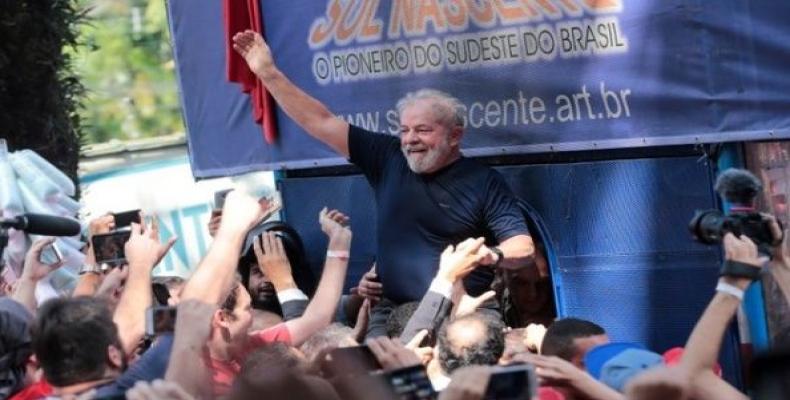Edited by Pavel Jacomino
2018-04-16 15:48:37
Facebook
Pinterest
Telegram
Linkedin
WhatsApp

Caracas, April 16 (RHC)-- Adolfo Perez Esquivel's campaign to nominate former Brazilian President Luiz Inacio 'Lula' da Silva for the prestigious Nobel Peace Prize has amassed over 180,000 signatures. The campaign, which was launched on Change.org last week, had aimed to reach a total of 150,000 signatures.
“I invite you all to participate in the campaign so that Lula receives the Nobel Peace Prize for his fight against poverty and inequality,” wrote the Argentinean human rights activist, sculptor, and architect. The recommendation letter he presented to the Norwegian Nobel Committee was also posted on the website.
It read, in part: “As you all know, peace is not just the absence of war, or the death of one or more people, peace is also to provide hope for the future of the people, especially those sectors that are most vulnerable.” He stressed that he decided to present Lula as a Nobel Peace Prize nominee due to his “social, (workers) union and political commitment in developing public policies to overcome hunger and poverty in his country, one of the unequal structures in the world.”
He went on to highlight official reports from the World Bank, Brazilian Institute of Geography and Statistics and other reports detailing the success of Lula's two terms in office, including a 50 percent decrease in unemployment, a seven percent decrease in those living below $3.19 per day and how public investments in education and health increased its Human Development Index.
“These results from the PT (Workers' Party) of Brazil to overcome poverty and hunger were not politics maintained by other government administrations, but a specific government administration that Brazil is gradually abandoning,” Perez Esquivel noted.
“Lula's government was a democratic and participatory construct, with non-violent means that elevated living standards of the population and gave hope to the most disadvantaged sectors (of society)... Lula's contribution towards peace are established concrete facts in the lives of the Brazilian people and reinforced by studies conducted by various international organizations.”
Lula was sentenced to 12 years and one month in prison on corruption charges by Brazil's Fourth Regional Federal Court. The Supreme Court of Justice rejected two habeas corpus appeals submitted by his defense team. Legal experts and observers attribute his case to a salacious media campaign coupled with “lawfare,” where political foes use loopholes in the judicial system to their advantage, neutralizing their opponents.
After delivering a rousing, motivational speech on the grounds of the ABC Steelworkers Union headquarters in Sao Bernardo do Campo, Sao Paulo Saturday, Lula was hoisted in the air by crowds of supporters, seemingly floating from the stage, amid the crowd and back into the building. Shortly after, he surrendered to federal police, adhering to an arrest warrant issued by Moro.
Having left office with a record approval rating of 83 percent in 2011, according to Datafolha, Lula, despite his legal woes and imprisonment, has topped every electoral poll conducted this year by Vox Populi, Datafolha, Data Poder 360, Instituto Parana, the National Confederation of Transportation/MDA and Ipsos.
Lula's two terms in office were marked by a slew of social programs, lifting millions of Brazilians out of poverty and removing the country from the United Nations World Hunger Map. One of his most ambitious and successful plans was Family Allowance (Bolsa Familia). Launched in 2003, it provided stipends to families living below the poverty line.


